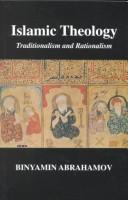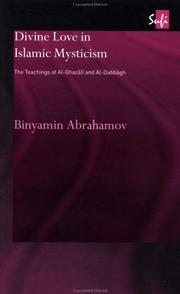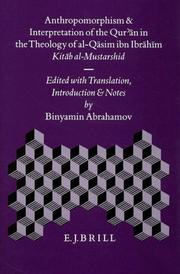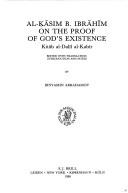| Listing 1 - 8 of 8 |
Sort by
|

ISBN: 0748611029 1474463789 Year: 1998 Publisher: Edinburgh Edinburgh University Press
Abstract | Keywords | Export | Availability | Bookmark
 Loading...
Loading...Choose an application
- Reference Manager
- EndNote
- RefWorks (Direct export to RefWorks)
Islam --- Théologie islamique --- Doctrines. --- Hadith. --- Faith and reason --- Hadith --- Islamic philosophy --- Rationalism --- 217 --- islam --- Knowledge, Theory of --- Religion --- Belief and doubt --- Deism --- Free thought --- Realism --- Dogma, Islamic --- Islamic theology --- Kalam --- Muslim theology --- Theology, Islamic --- Theology, Muslim --- Arabic philosophy --- Muslim philosophy --- Philosophy, Islamic --- Philosophy, Arab --- Tradition (Islam) --- Islamic law --- Islamic literature --- Sunna --- Faith and reason (Islam) --- Islam and reason --- Doctrines --- Islamic philosophy. --- Rationalism. --- Islam. --- History

ISBN: 9781136129223 1136129227 9780203037461 0203037464 9781136129308 1136129308 9781136129384 1136129383 0700716076 9780700716074 9780415664691 1283962985 9781283962988 Year: 2003 Publisher: London ; New York : Routledge,
Abstract | Keywords | Export | Availability | Bookmark
 Loading...
Loading...Choose an application
- Reference Manager
- EndNote
- RefWorks (Direct export to RefWorks)
The two theories of divine love that are examined in this book have their foundations in Greek, Jewish, Christian and Muslim ideas. Al-Ghazâlî (twelfth century) was influenced mainly by Plato and Ibn Sina's teachings, while al-Dabbâgh (thirteenth century), who accepted some Ghazâlîan notions, developed a theory of divine love that can be traced back to Neoplatonism. Both scholars created complete theories of divine love that include definitions of love, its causes and signs, the ways to love God, God's love for man, and kinds of love. The book will interest students of theology, philosophy and
God (Islam) --- Sufism --- Love --- Worship --- Worship and love. --- Doctrines. --- Ghazzālī, --- Dabbāgh, ʻAbd al-Raḥmān ibn Muḥammad, --- ʻAbd al-Raḥmān ibn Muḥammad al-Dabbāgh, --- Anṣārī, ʻAbd al-Raḥmān ibn Muḥammad, --- دباغ، عبد الرحمن بن محمد --- دباغ، عبد الرحمن بن محمد،
Book
ISBN: 9652262994 Year: 2006 Publisher: Ramat-Gan Bar-Ilan university press
Abstract | Keywords | Export | Availability | Bookmark
 Loading...
Loading...Choose an application
- Reference Manager
- EndNote
- RefWorks (Direct export to RefWorks)
Book
ISBN: 9789004452015 9789004104082 Year: 1996 Publisher: Leiden;Boston BRILL
Abstract | Keywords | Export | Availability | Bookmark
 Loading...
Loading...Choose an application
- Reference Manager
- EndNote
- RefWorks (Direct export to RefWorks)
The present work deals with anthropomorphism and interpretation of the Qur'ān in the theology of the Zaidite imam al-Qāsim ibn Ibrāhīm (785-860 A.D.). The edition and annotated translation of al-Qāsim's epistle Kitāb al-mustarshid is preceded by a detailed introduction, which treats early Islamic theology. For the abrogation of the literal meanings of Qur'ānic anthropomorphic expressions, the author uses similes, idioms and phrases in Arabic, pieces of evidence from ancient Arabic poetry and rational arguments which often reflect the Mu'tazilite ways of dealing with anthropomorphism. The second subject, the place of the Qur'ān in al-Qāsim's writings and his methods of interpretation of the Qur'ān, bears directly upon his doctrines in general and upon his doctrine of anti-anthropomorphism in particular, and also contributes to the understanding of the development of Qur'ānic exegesis in the first half of the ninth century.
God (Islam) --- Attributes --- History of doctrines --- Qāsim ibn Ibrāhīm, --- Anthropomorphism (Islam)
Book
ISBN: 9781474463782 Year: 2022 Publisher: Edinburgh
Abstract | Keywords | Export | Availability | Bookmark
 Loading...
Loading...Choose an application
- Reference Manager
- EndNote
- RefWorks (Direct export to RefWorks)
Multi
ISBN: 9781474463782 9780748611027 Year: 1998 Publisher: Edinburgh Edinburgh University Press
Abstract | Keywords | Export | Availability | Bookmark
 Loading...
Loading...Choose an application
- Reference Manager
- EndNote
- RefWorks (Direct export to RefWorks)
The principal theological struggle in Islam has taken place between traditionalist and rationalist theologians. Assessing materials from the 3rd/9th century to the 10th/16th century, Professor Abrahamov focuses on the foundations of both traditionalism and rationalism, the arguments which the two tendencies used against each other and the compromises reached. This is a ground-breaking study by a renowned scholar and writer.https://edinburghuniversitypress.com/book-islamic-theology.html
Religious studies --- Sociology of religion --- Islam --- Theologie --- Rationalisme (filosofie) --- Traditie --- Denken --- Geschiedenis

ISBN: 9004104089 900445201X Year: 1996 Volume: 26 Publisher: New York Leiden Brill
Abstract | Keywords | Export | Availability | Bookmark
 Loading...
Loading...Choose an application
- Reference Manager
- EndNote
- RefWorks (Direct export to RefWorks)
God (Islam) --- Allah --- Monotheism (Islam) --- Islam --- Attributes&delete& --- History of doctrines --- Qāsim ibn Ibrāhīm, --- God (Islam) - Attributes - History of doctrines. --- Anthropomorphism (Islam) --- Attributes

ISSN: 01698729 ISBN: 9004089853 9789004089853 9789004451117 9004451110 Year: 1990 Volume: 5 Publisher: Leiden;Boston BRILL
Abstract | Keywords | Export | Availability | Bookmark
 Loading...
Loading...Choose an application
- Reference Manager
- EndNote
- RefWorks (Direct export to RefWorks)
Islam --- doctrines --- God (Islam) --- -Islam --- -Mohammedanism --- Muhammadanism --- Muslimism --- Mussulmanism --- Religions --- Muslims --- Allah --- Monotheism (Islam) --- Proof --- -Early works to 1800 --- Doctrines --- -Proof --- God (Islam) - Proof - Early works to 1800 --- Islam - Doctrines - Early works to 1800. --- Mohammedanism --- Early works to 1800 --- Doctrines&delete& --- Islam - Doctrines --- Theology
| Listing 1 - 8 of 8 |
Sort by
|

 Search
Search Feedback
Feedback About UniCat
About UniCat  Help
Help News
News